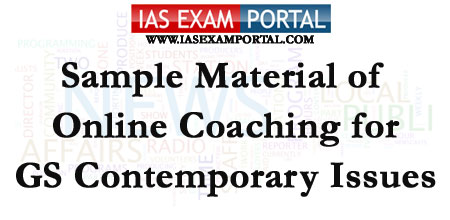(Sample Material) Online Coaching for Contemporary Issues of GS: Economic & Social Development (Tax and the People)

(Sample Material) Online Coaching for Contemporary Issues of GS: Economic & Social Development (Tax and the People)
According to the Indian Constitution, both the levy and
collection of taxes must be based on some enactment passed by a competent
legislature, and not on an executive order. In our legal wrangling, we often
lose focus of the inherent democratic spirit enshrined in the preamble of the
Constitution. The ultimate purpose of the entire legal and political edifice is
to acknowledge and buttress the democratic existence of the body politic.
Given this backdrop, the current policy thrust of expanding the taxpayer base in
smaller towns and cities should be taken up in a democratic spirit, and not just
as a bureaucratic initiative. Admittedly, the Central tax administration is
somewhat aloof, if not completely alien, to the particularistic local environs
of a mofussil town.
A new institutional impetus is required, especially in terms of civic participation of taxpayers, not only in the expansion of the tax base and improvement of collections but also in terms of the development process as a whole. This would aid other policy areas of the government such as the Swachh Bharat and Make In India initiatives. There is a dire need to link tax collection with tax spending at the micro level. Doing so will give the taxpayer a sense of belonging and empowerment.
There is a need to make the usage of tax revenues more transparent. The usage should also be linked to the collections from a particular mofussil town. The notion of “fiscal connection” needs to be manifestly built in through a deliberative and consultative application of tax revenues. This will generate a sense of esteem for public works.
More specifically, we need to try out novel ideas like the creation of taxpayers’ benefit councils in certain mofussil towns. Such a council should have members of local taxpayer bodies, leading taxpayers of the city, tax officials and district officials. The funding of these councils should be earmarked and linked to the total Central tax collection of the town and a percentage of it, say 5 per cent, should be benchmarked as a corpus annual fund.
These funds should be utilised by the council for local initiatives like the Swachh Bharat Abhiyaan, urban renewal and the creation of micro infrastructure. Roads, parking lots or even the provisioning of a local transformer are the kinds of micro infrastructure that can facilitate electricity supply, promote business, encourage local industry and trade in the larger context of Make In India.
The scheme would give local taxpayers a sense of pride that they have a say in the spending of at least a portion of their own taxes. It would also give them a sense of empowerment, participation and a voice in local issues. The linking of this fund to total collections would incentivise tax collection and even make the district administration an interested party in boosting tax collection, as it would eventually have more funds for local purposes. The potential of democratic citizenship and civic participation needs to be fully explored and operationalised for expanding the tax base, boosting tax collection and engendering trust between tax-paying citizens and the instrumentalities of state.
The tax department would be seen a shade more taxpayer-friendly and a partner in local initiatives of development. It would go a long way in encouraging fence-sitters to become taxpaying citizens and have a civic identity of a respected taxpayer. The system could create a new kind of administrative synergy between Central, state and local government establishments — a cooperative federalism of sorts.
Concepts of democracy, nation-building, development and tax collection need to be perceived as a continuum. Novel policy initiatives are required to develop these linkages through civic participation of taxpayers and officials.

